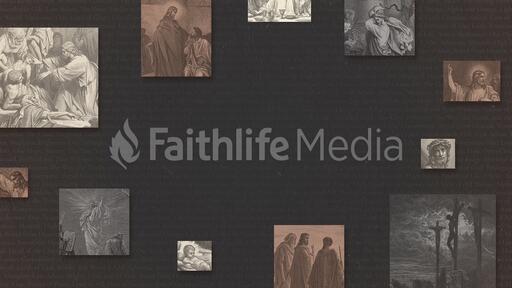Intro (Rom. 1:1-6)
Sermon • Submitted • Presented
0 ratings
· 3 viewsNotes
Transcript
Let’s begin by reading the text set before us today.
From Paul, a slave of Christ Jesus, called to be an apostle, set apart for the gospel of God.
This gospel he promised beforehand through his prophets in the holy scriptures,
concerning his Son who was a descendant of David with reference to the flesh,
who was appointed the Son-of-God-in-power according to the Holy Spirit by the resurrection from the dead, Jesus Christ our Lord.
Through him we have received grace and our apostleship to bring about the obedience of faith among all the Gentiles on behalf of his name.
You also are among them, called to belong to Jesus Christ.
Introduction
Introduction
Years ago, I attended a convention, and during the last service, the attendees honored a man named Carlilse Hannah, a missionary to India for what I believe to be seventy years. He worked so hard, continuing to serve the people of India even after his wife passed away. He served in India for as many years as many people hope to live. Hanna served unfailingly through wars, pestilence, earthquakes, Bengal tigers, disease, severe spiritual attacks, and the loss of a child and spouse. This was in many ways his climatic moment. He is being recognized in front of thousands, as many seem to hail him as one of the greatest FWB missionaries to have ever lived.
Given an opportunity to speak, he said little more than encouraging the audience to pray for the people of India, who were in much need to hear the good news. There was no moment that he acknowledged all the good he had done. There seemed to be no joy on his face, recognizing that he had done so well to finish his task. Only a heartfelt, stern encouragement that the people would pray for those in India.
In many ways it seemed unfulfilling, that he wouldn’t take it in, as the moment, the highest point of his life. But instead, he found himself, his identity not shaped by his accomplishments, but shaped by the good news about Jesus, committed to taking it to the ends of the earth.
Identity Shaped by Good News
Identity Shaped by Good News
As is typical of letters, Paul begins his letter with what should be a short greeting—Paul wrote several letters, so he knows how this goes. See, we can observe how he’s done it elsewhere.
From Paul, called to be an apostle of Christ Jesus by the will of God, and Sosthenes, our brother,
In many ways, this introduction is very simple, yet he seems to change it up here in his letter to the Roman believers. His introduction, which should serve to identify him, present his credentials, and encourage the recipients, is hijacked by the God’s good news.
Romans 1:1 (NET 2nd ed.)
From Paul, a slave of Christ Jesus, called to be an apostle, set apart for the gospel of God.
Paul had quite the list of accolades:
I was circumcised on the eighth day, from the people of Israel and the tribe of Benjamin, a Hebrew of Hebrews. I lived according to the law as a Pharisee.
In my zeal for God I persecuted the church. According to the righteousness stipulated in the law I was blameless.
Yet, in establishing this new relationship with the believers in Rome, Paul appeals to his role in the good news.
He is:
A slave (servant) of Christ Jesus
Yes, Lord! I am indeed your servant; I am your servant, the son of your female servant. You saved me from death.
“You are my witnesses,” says the Lord, “my servant whom I have chosen, so that you may consider and believe in me, and understand that I am he. No god was formed before me, and none will outlive me.
A called apostle
From Paul, an apostle (not from men, nor by human agency, but by Jesus Christ and God the Father who raised him from the dead)
set apart for God’s good news
And, that’s enough.
His identity naturally bled over to an explanation of the good news. This is especially interesting because it seems that we are so often cold toward sharing the good news about Jesus with people because it does not seem to be organic, as though it is our very identity.
The Content of the Good News
The Content of the Good News
The good news is from God.
This phrase, “gospel of God” leaves us with two options grammatically. Either, it is the good news that God brings, or it is the good news about God. Yet, in this instance, it is certainly possible that Paul is aware of the potential double meaning, and so it is both, the good news about God from God!
The good news is from Scripture (OT).
Perhaps a most glaring weakness of the church in the United States is the inability to decipher the OT. Many of you might have ran across on your social media promises that the end is near, citing passages like that of Jonah and even Exodus 4:8 to assert an obscure end-times theory.
Or, you may have been taught from an early age that you need to model your life after biblical figures like Abraham, Sarah, Isaac, Joseph, Moses, David, Deborah, Ruth, Esther, or you may have been taught the opposite that you ought to merely avoid all the bad character behaviors.
Yet, it is most clear from the OT that a figure, a messiah, is promised to redeem the creation that has so utterly messed up.
And I will put hostility between you and the woman and between your offspring and her offspring; he will strike your head, and you will strike his heel.”
Now the Lord said to Abram, “Go out from your country, your relatives, and your father’s household to the land that I will show you.
Then I will make you into a great nation, and I will bless you, and I will make your name great, so that you will exemplify divine blessing.
I will bless those who bless you, but the one who treats you lightly I must curse, so that all the families of the earth may receive blessing through you.”
The Lord your God will raise up for you a prophet like me from among you—from your fellow Israelites; you must listen to him.
When the time comes for you to die, I will raise up your descendant, one of your own sons, to succeed you, and I will establish his kingdom.
He will build a house for my name, and I will make his dynasty permanent.
This is only a small sample size; not only do specific Scriptures in the OT point a messiah, a Christ. But, offices, institutions, and events point toward an even greater fulfillment.
Israel needs a good prophet, priest, king, yet they never recieve one who can do it all. The sacrificial system served its purpose, but it was itself insufficient. Israelites looked forward to a time when God would perform a ‘new exodus.’
Certainly, this good news is from the OT.
The good news is about Jesus.
Jesus is the Christ, the one figure the OT pointed toward.
Jesus was an earthly descendant of David, making known that he was both from a kingly lineage, both also very human.
Jesus demonstrated that not only is he God’s son, but he has been determined to be the powerful son of God by means of his resurrection.
Thus, Jesus is the Christ, and he is Lord!
He demands repentance and faith.
The Goal of the Good News
The Goal of the Good News
For Faith-based obedience
The good news is not about moral perfection or the absence of obscene evils. This is not about whether you haven’t done anything awful. The goal of the good news was to get you to believe and obey!
In all nations
The good news is for all people; its effect, its scope, its goal, is for all peoples to believe and obey. This is not some movement to be kept in one geographical location for one culture and one people, one language, and one gender. This is for all peoples in all nations.
For his name.
The goal of the good news is not...
A care-free life in heaven
The absence of pain
A get-out-of-hell free card
The goal of the good news is that an awesome God is praised for his glory and awesomeness in bringing people to belief in his son!
Conclusion
Conclusion
Many of you have an identity shaped by your parents, your society, your interests. Many of you need to be eclipsed, by the good news, such as Paul is in his introduction, such as Carlilse Hannah, at the climatic moment of his life’s worth.
Let’s return to Paul’s identity:
slave of Christ Jesus
called apostle
set apart for God’s good news
You need to submit to Christ Jesus, the Lord. Consider that you are a slave to either Christ or sin.
You need to find your identity in relation to how you advance the good news.
As you’re taking classes, as you’re finding jobs, as you’re making new relationships, you need to consider your identity, whether it is rooted in the good news.
Some of you have not believed in this awesome good news, that God has shown his love for you in Jesus. Remember, it’s:
his good news
about God
in the OT
about Jesus
Simply, you need to believe and repent. Remember, you do not obey to earn salvation, but you obey him because you have believed.
For others of you, you need to clear your vision. Perhaps for too long you have viewed the good news as some good advice. Perhaps you have not viewed it as for all peoples in all nations. Or, perhaps you have strayed from understanding that the purpose of the good news is not to make much of you, but to make much of God.
As Carlilse Hannah, and as Paul, find your identity in the good news of Jesus, believe in the good news about Jesus, and understand that only through Jesus have you been given grace to bring about faith-based obedience in all the world for God’s glory.




